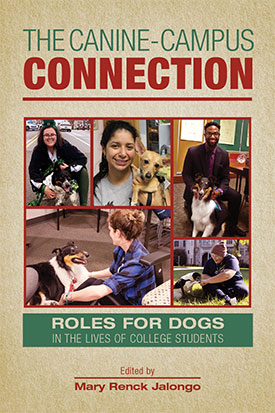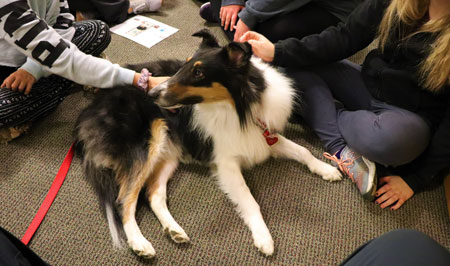- YouTube
- TikTok
New book examines roles for dogs in the lives of college students
The 10-chapter volume features contributors from around the U.S., including two with OU ties

As colleges and universities look to address the growing mental health crisis on campuses across the nation, a new book is touting the benefits of the human-animal bond. Published by Purdue University Press, “The Canine-Campus Connection: Roles for Dogs in the Lives of College Students” provides evidence-based guidance on bringing college students and canines together in mutually beneficial ways.
The 374-page volume is edited by OU alumna Mary Renck Jalongo, Ph.D., and features 10 chapters, including one co-authored by Amy Johnson, Ed.D., director of the Center for Human Animal Interventions at Oakland University and senior coordinator of continuing education in OU’s School of Nursing. Jalongo, a professor emerita from Indiana University of Pennsylvania, says positive interactions between students and dogs can increase students’ feelings of well-being and reduce feelings of stress, anxiety and depression.
“Positive interactions between people and dogs tend to increase the feel-good hormone, oxytocin, and reduce the stress hormone, cortisol,” Jalongo explained. “In studies that look at physiological signs of stress (e.g. blood pressure, heart rate) as well as self-report data gathered from participants, positive interactions between people and dogs tend to elevate positive mood, provide a study break and encourage conversation with peers and staff.”
Jalongo noted that it’s becoming common for therapy dogs to visit college campuses during exam week to help students relax and de-stress. The dogs are carefully selected, trained and tested to go on visits with their owner/handlers.
|
“Therapy dog events tend to be well-attended by students and are low-cost because they are staffed by volunteer dog handler/therapy dog teams,” said Jalongo. “Therapy dogs are prepared to venture away from home and interact with people.”
Along with exploring the benefits of positive human-animal interactions, the book also examines ethical issues surrounding the presence of dogs in public spaces like college campuses. Johnson and Laura Bruneau, Ph.D., a professor at Adams State University in Alamosa Colorado, co-authored a chapter entitled "Bringing Postsecondary Students Together with Dogs: Dog Welfare, Health, Safety, and Liability Considerations."
“Since we are seeing more therapy dogs on campus, there is often a focus on the positive effects of how the visits with dogs make the students feel,” Johnson said. “However, we also need to think about students who do not want dogs on campus, whether because of phobias, cultural beliefs, or allergies, and how to ensure that the dogs on campus have been health-checked, prepared, evaluated, registered, are suitable for this type of work and actually willingly participate in the work.”
According to Jalongo, these issues can be addressed through carefully crafted policies and procedures that protect the health and safety of humans and dogs.
“On many campuses, a residence hall is designated as animal-friendly, so students with allergies or phobias can opt out,” she said. “Concerns about disease transmission can be addressed by requiring any dog on campus to be current on vaccinations and requiring a verification of health from a veterinarian. There are national organizations and institutions that have developed useful guidelines for others to use and adapt to their specific contexts.”
 |
The book also highlights the major categories of dogs that students are likely to interact with on and off campus: service dogs, emotional support animals, therapy dogs and homeless dogs, and emphasizes ways in which dogs can influence student learning during classes and in professional development. The authors advocate for creating a more dog-friendly campus culture, with a focus on planning events, projects and programs in ways that promote positive and safe interaction between dogs and humans.
Jalongo has been training her own dogs since 2006. In 2014, she began teaching incarcerated individuals who were learning to train service dogs for people with disabilities. In addition, she has volunteered with college students at a no-kill animal shelter to photograph and promote adoption of homeless dogs and cats via social media. Over the past 14 years, she has made hundreds of visits to education and health care facilities with her four registered and insured therapy dogs—two greyhounds and two collies.
She currently serves as a tester/observer of therapy dog teams for Alliance of Therapy Dogs and is guest editing a special issue of the Early Childhood Education Journal on humane education and the child/companion-animal bond. Johnson and Bruneau are co-editors on the issue.
Jalongo is the author, co-author, or editor of more than 40 books and has earned eight national awards for excellence in writing. She holds a bachelor’s degree from the University of Detroit-Mercy, a Master of Arts in Teaching from Oakland University and a doctorate in Curriculum and Instruction from the University of Toledo.
Johnson earned a Master of Arts in Counseling from Oakland University, a Master of Teaching from Wayne State University and a Doctorate of Education from Oakland University and is also a nationally certified dog trainer. She developed and directs the online Animal Assisted Intervention Certificate program at Oakland and currently offers an occupational experience for pre-vet students at the Oakland County shelter. She has published journal articles and book chapters on the topics of dog welfare and animal-assisted interventions/human-animal interactions, including prison-based dog programs.
For more information about “The Canine-Campus Connection,” view the publisher’s website.


 May 27, 2021
May 27, 2021